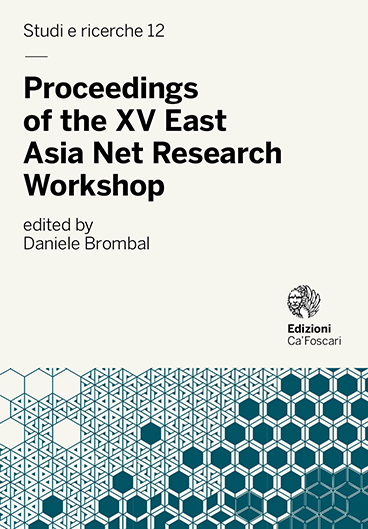Series |
Studi e ricerche
Edited book | Proceedings of the XV East Asia Net Research Workshop
Chapter | Ecological Discourse and Ecological risk in China
Ecological Discourse and Ecological risk in China
Abstract
This paper will outline three sources of ecological discourse for the defence of ‘ecological civilisation’ and ‘ecological Marxism’ and the promotion of an ‘ecologically civilised society’. in response to ecological risk in China: the official, governmental ecological discourse (official think tanks, ministry documents); the formal academic, nongovernmental ecological discourse (academics, advisers, opinion-makers); the informal nongovernmental or emergent civil society ecological discourse (social movements, protest movements, critical analysis of risk and governmental policy). The working hypothesis of this study is that, even though awareness of ecological risk and the need for an ‘ecologically civilised society’ is high among the emergent civil society, the ministry advisers and policy-makers, and the opinion-makers, the management of ecological risk is hampered by contradictory priorities and criteria in the meritocratic evaluation of performance by government and Party officials, on the one hand, and the need to generate wealth, on the other. This debate is analogous to the debate on efficiency (the generation of wealth) and equity (the redistribution of wealth) in the field of economic planning and performance, and a symptom of the increasing complexity of competing and contradictory priorities as the nature of Chinese modernisation evolves.
Submitted: Jan. 23, 2017 | Accepted: Feb. 1, 2017 | Published Dec. 19, 2017 | Language: en
Keywords Chinese ecological discourse, ecological Marxism,
Copyright © 2017 Sean Golden. This is an open-access work distributed under the terms of the Creative Commons Attribution License (CC BY). The use, distribution or reproduction is permitted, provided that the original author(s) and the copyright owner(s) are credited and that the original publication is cited, in accordance with accepted academic practice. The license allows for commercial use. No use, distribution or reproduction is permitted which does not comply with these terms.
Permalink http://doi.org/10.14277/6969-190-4/SR-12-1
